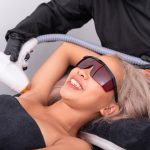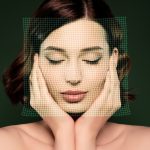Laser hair removal (LHR) has become the preferred method of eliminating unwanted facial and body hair for a lot of people. However, the treatment is not without some controversy when it comes to dark skin.
Once and for all, it’s time to dispel common myths surrounding laser hair removal for Black skin in College Park, Maryland!
Fiction: Laser Hair Removal Damages Black Skin
Fact: Damage can be avoided if it’s done by a skilled provider and with the right technology.
When it comes to LHR for dark skin, there are two noteworthy lasers that you should be aware of.
- The Nd:YAG laser bypasses melanin in the skin, making it a safer choice for Black skin. Instead, its wavelengths directly and precisely target hair follicles.
- The diode laser delivers light energy at a slower rate compared to traditional lasers. This allows your skin to cool between passes, reducing the risk of damage.
Remember that the effectiveness of LHR depends on the expertise and experience of your provider. Always opt for a licensed medical professional with extensive experience in laser hair removal for dark skin.
Fiction: You Can Achieve Optimal Outcomes With One Session of Laser Hair Removal for Black Skin in College Park, Maryland
Fact: You need multiple sessions for sensational results.
The number of treatments you require depends on multiple factors such as the size of the area(s) you wish to treat, how coarse the hair is, and your goals.
Another important variable is the stages of hair growth which has four phases:
- Anagen: Growth phase
- Catagen: Transitional phase between growth and shedding
- Telogen: Shedding period, creating space for new growth
- Exogen: Individual hair strands released from follicles, falling out
Laser hair removal for Black skin in College Park, Maryland is most efficient during the anagen stage. Because different follicles are in the anagen phase at different times, it may take from four to six sessions or more for successful long-term hair reduction.
Fiction: Laser Hair Removal Isn’t Safe for People of Color
Fact: LHR Is a treatment suitable for almost everyone.
What matters is safety. To determine your eligibility, plan to schedule a laser hair removal consultation with an experienced provider.
Ideal candidates for laser hair removal meet the following criteria:
- You need to be generally healthy and have skin free from open wounds, infections, or other skin conditions in the treatment area.
- You should have reasonable expectations about the outcomes of the procedure, understanding that it may require multiple sessions for optimal results.
- If you are pregnant or breastfeeding you may need to postpone treatment.
- It’s important to avoid sun exposure and tanning beds before and after treatments, as this can increase the risk of complications.
Fiction: Laser Hair Removal Is Painful
Fact: While it is possible to feel a slight stinging sensation, LHR is generally well tolerated.
There are proactive steps you can take to ensure your comfort.
Make it a priority to find a reputable provider who utilizes the proper technology and has experience treating darker skin. You can ask for a topical numbing cream to be applied before the procedure.
You need to carefully follow all pre-laser and post-treatment instructions given to you. Keep in mind that you should start preparing about two weeks before your first appointment. As previously mentioned, sun exposure is off limits, and sunscreen is a must.
After LHR, be mindful of the products you apply to the treated areas. Perfumes and lotions with fragrances, deodorants, and self-tanners can irritate your skin.
Choose beBold Aesthetics for Safe and Effective Treatments No Matter Your Skin Tone!
Our team believes the Triton laser is the safest and most effective technology for all of our patients. Text us now at 443-699-1797 to book your consultation and let’s talk about your goals. Whether you wish to remove hair in one area or all over, we can help!






